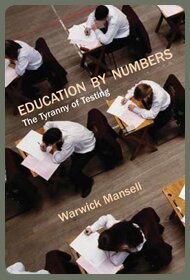Thursday, December 10th 2009
I’ve not done this before, but I’m posting an exclusive news story here. In the New Year, I intend to have a personal website/blog not directly related to the book. This might feature some articles which I’ve not had published. In the meantime, this seemed the best place for the story below.
Warwick Mansell
Teachers preparing to mark next year’s Sats exams for 11-year-olds have been banned from speaking to the media or discussing any problems with the tests in online discussion forums.
Contracts sent this week to markers by the test marking firm Edexcel include a gagging clause forbidding them from disclosing any information about the marking process to reporters or, most contentiously, among themselves on “online forums or social networking sites”.
The contracts, themselves marked “confidential”, say: “You must not disclose any information to the media or any other forum in the public domain, including posting on online forums and social networking sites, about any aspect of your work with Edexcel without the express permission of the company.” The stipulation about online forums and networking sites did not appear in last year’s contracts. Examiners have always been banned from sharing publicly information about the content of tests in advance of them being taken, but the new clause goes far further than this, to extend to all aspects of the examining process.
A statement from the company suggested that the ban also applies to GCSE and A-level examiners.
In recent years, Sats examiners, either retired teachers or serving professionals who mark in their spare time at home, have used prominent websites which are open to the public to post comments about the marking process, including many complaints.
Thousands of messages of unhappiness, including complaints of papers going astray and glitches in the computerised systems used to check on marker quality, were registered on the Times Educational Supplement’s website during the 2008 marking fiasco which led to the late announcement of 1.2 million pupils’ results and the termination of the contract of the previous company responsible for the marking, ETS Europe.
This helped to trigger media coverage of the problems. In 2009, a lesser number of complaints on the forums also led to reports of difficulties with the marking process. Examiners say the forums are also vital in helping them to address perceived anomalies in the tests’ mark scheme.
One experienced marker of the English tests said: “I feel very uncomfortable about being effectively barred from any communication with other markers. Being able to discuss concerns and share opinions was the one thing that made the process manageable this year.”
A second English marker said: “Other than the contact we have with our supervisor, markers are in total isolation. The forums are a very major source of information and support. For example, it is only by being able to exchange information with other markers that we can confidently get clarification on the accepted and agreed marks relating to answers to particular questions.
“Perhaps Edexcel are concerned about the discussion forums. But they are not making our job any easier.”
The Sats tests in English and maths are not guaranteed to go ahead next year, with two major teachers’ unions threatening a boycott of the exams scheduled for next May. Some 76 per cent of National Union of Teachers members taking part in an indicative ballot on a boycott of next year’s tests said they would support a ballot, it was announced today (Thursday). The turnout was just under 25 per cent.
An Edexcel spokesperson appeared to confirm today that none of its markers and examiners would be allowed to post discussions of the marking process on public discussion forums such as those of the TES.
She said: “The clause is included in all Edexcel marker contracts (regardless of which qualification they are marking for) to ensure the integrity and confidentiality of our tests and examinations and of student information and exam responses. Support is available to national curriculum test markers through their supervisors, a dedicated website and the Edexcel subject team.”
By the way, you can now follow me on twitter @warwickmansell.
- Warwick Mansell
1 Comment
posted on December 10th, 2009
